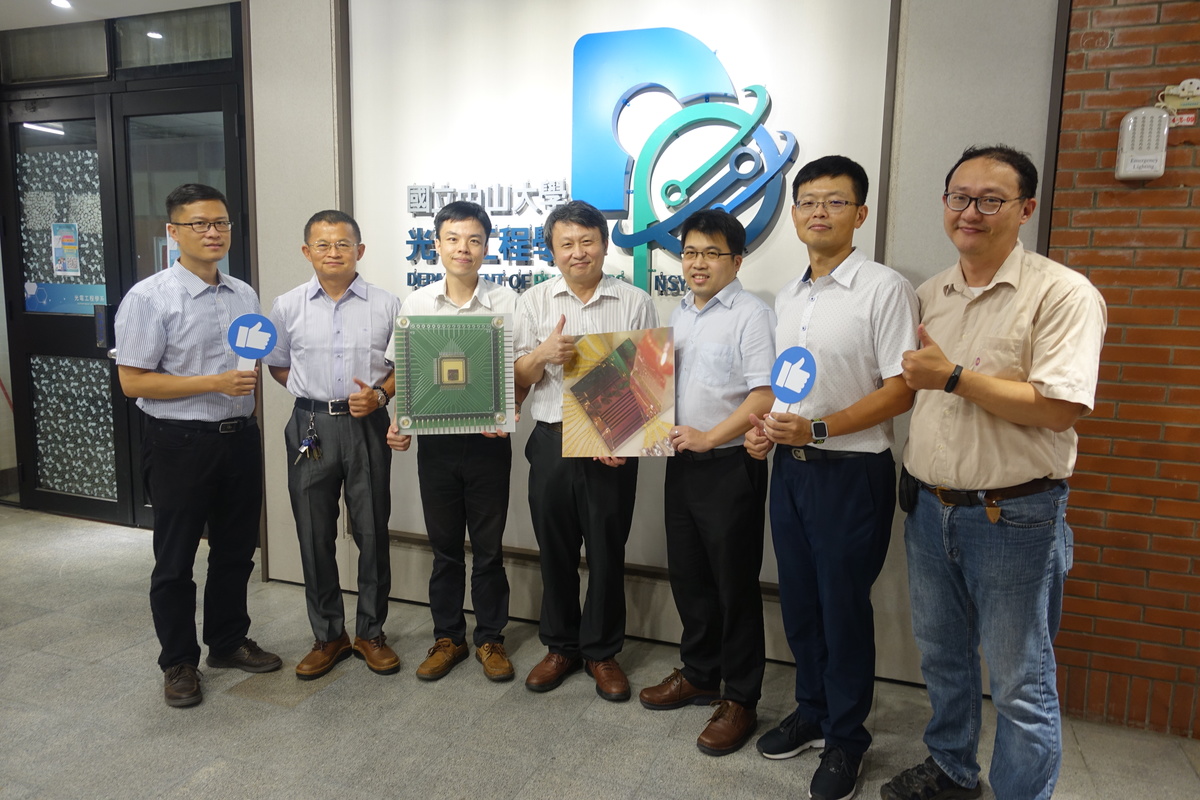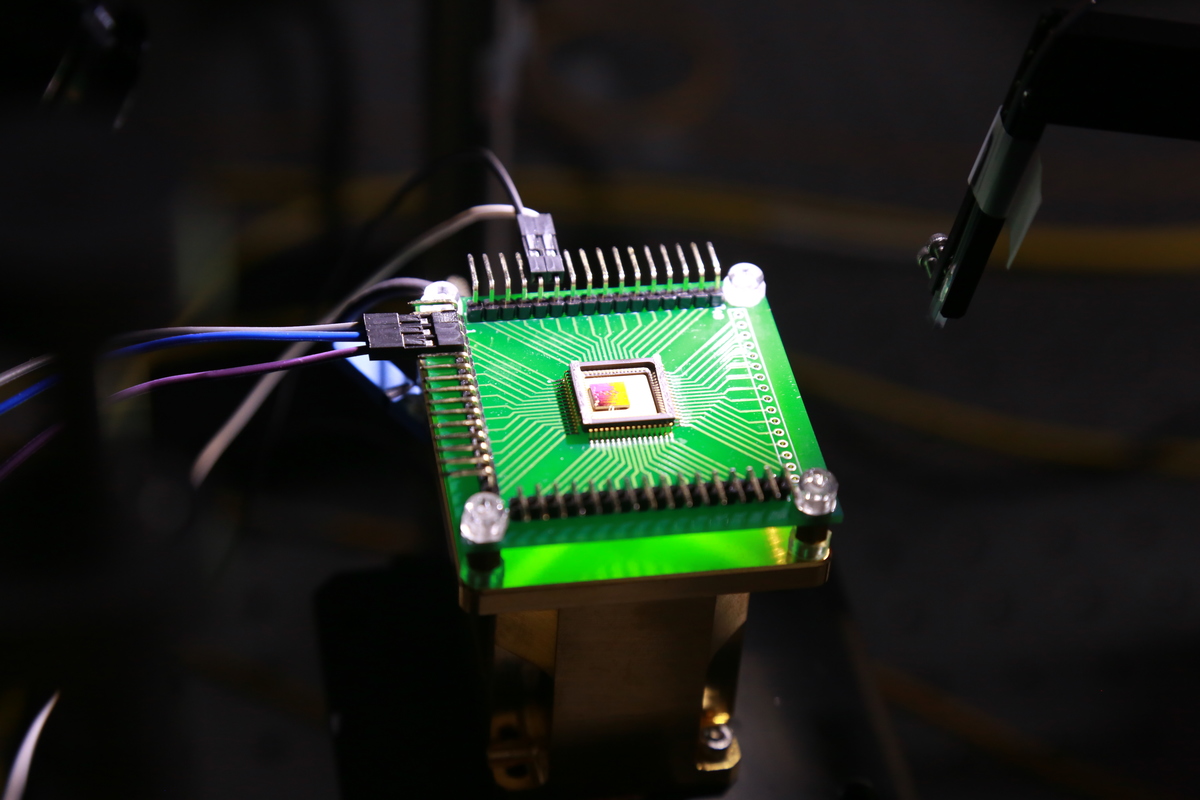NSYSU team developed miniaturized silicon photonic gyroscope driver chip the size of a mung bean



The Department of Photonics at National Sun Yat-sen University (NSYSU) has established an academia-industry research collaboration to develop a new type of silicon photonic gyroscope modules – hybrid interferometric optical gyroscope. Over the past two years, the NSYSU team has reached a milestone, using the Si photonic technology, and demonstrated the first miniaturized Si photonic fiber-optic gyroscope driver chip in the world, which has shown a great potential for mass production. The volume of the whole chip does not surpass 5 mm2 – it is as small as a mung bean, and the production cost was reduced to one third. Professor Yi-Jen Chiu of the Department of Photonics, NSYSU, said that the main application of the silicon photonics gyroscope is in the huge market of miniaturized navigation, including biomedical testing, self-driving cars, smart robots, GPS aircraft tracking, and CubeSat.
The fiber-optic gyroscope available on the market is a system formed by many scattered elements, which can be compared to a desktop computer with its screen, main unit, and keyboard, all in separate units. The fiber-optic gyroscope driver chip developed by the Department can be compared to a laptop, with all these elements integrated into one device and greatly miniaturized, not only made light and convenient but also with higher processing effectiveness.
Taiwan is the global leader in the production technology of wafers and has an advanced and mature production line in the semiconductor industry. Naturally, the silicon photonics technology is linked to the wafer production line and thus suits the development of the high-tech industry in Taiwan. The research team was formed two years ago, with Professor Yi-Jen Chiu and Distinguished Research Fellow Jen-Yang Liu of NSYSU as leaders, and included professors Chua-Chin Wang, Tsung-Hsien Lin, Jin-Wei Li, Chia-Chien Wei, associate professors Chin-Ping Yu and Yung-Jr Hung, and assistant professor Chun-Ta Wang. The team integrated the research capacity of Taiwan Semiconductor Research Institute and CORETECH Optical Co. Ltd, got the support of the flagship project in silicon photonics of the Ministry of Science and Technology, and developed the hybrid silicon photonic fiber-optic gyroscope.
The R&D team pointed out that the miniaturized fiber-optic gyroscope driver chip uses an advanced concept of the design of silicon photonic units, greatly miniaturizing the volume of the chips, reducing production costs, and giving bright prospects for the future. In the past 10 years, the groundbreaking technology of silicon photonic integrated circuits has attracted a lot of attention. Using photons to transport and process signals offers many advantages: ultrahigh bandwidth, high resolution, reduced energy consumption, and no electromagnetic interference. Photons’ application has been extended to be widely applied in optical sensing systems, a high-speed optical connection, the Internet of Things, quantum computing, and biomedicine. International semiconductor giants such as Intel, GlobalFoundries, and Samsung invested their human resources to develop this technology, and have already had many commercial success stories.
The Department of Photonics at NSYSU has conducted long-term research on optoelectronic semiconductors, invested in the development of silicon photonics technology, assisted the Industrial Technology Research Institute in establishing a database on silicon photonic passive component design, and carried out the first national project on silicon photonics research in Taiwan, laying solid foundations for silicon photonics technology. Over the years, the team of the Department of Photonics at NSYSU has assisted the Taiwan Semiconductor Manufacturing Co. Ltd. (TSMC), and OCP Asia Inc. in developing silicon photonic systems and key elements, high-speed lasers, and modulators with LandMark Optoelectronics Corporation, and signed an MOU with the National Institute of Advanced Industrial Science and Technology (AIST) in Japan to jointly develop heterogeneous integrated silicon photonics technology. The Department of Photonics, NSYSU, and Ghent University in Belgium signed an agreement on dual-degree programs (master and Ph.D.) and connected with IMEC, the largest silicon photonic producer in Europe to cultivate top-level professionals in the field of silicon photonics.
Note:
In 2018, the Department of Engineering and Technologies, Ministry of Science and Technology, proposed a national silicon photonics project plan to accelerate the development of silicon photonics research in Taiwan; the team of the Department of Photonics at NSYSU was selected for the project. In this project, the team was led by Professor Yi-Jen Chiu, the former Chair of the Department of Photonics, who was the planning leader, responsible for the development of the broadband spectrum light source technology. The recruited co-host of the project Dr. Jen-Yang Liu, an expert in fiber-optic gyroscope, injected new energy into the industry. To develop gyroscope packaging technology and miniaturize the fiber ring, Professor Chua-Chin Wang of the Department of Electrical Engineering, NSYSU, was invited to develop closed-loop electronic circuit chips. The silicon photonic gyroscopic chips were jointly developed by professors Chin-Ping Yu, Tsung-Hsien Lin, Yung-Jr Hung, and Chun-Ta Wang of the Department of Photonics; the research on low-loss optical waveguide coils was led by Professor Chao-Kuei Lee; the development of system measurement and noise-reduction technology was led by Professor Chia-Chien Wei. The team obtained excellent research results within two years. The team published some of their research results in related journals and top international conferences and filed patent applications.
The fiber-optic gyroscope available on the market is a system formed by many scattered elements, which can be compared to a desktop computer with its screen, main unit, and keyboard, all in separate units. The fiber-optic gyroscope driver chip developed by the Department can be compared to a laptop, with all these elements integrated into one device and greatly miniaturized, not only made light and convenient but also with higher processing effectiveness.
Taiwan is the global leader in the production technology of wafers and has an advanced and mature production line in the semiconductor industry. Naturally, the silicon photonics technology is linked to the wafer production line and thus suits the development of the high-tech industry in Taiwan. The research team was formed two years ago, with Professor Yi-Jen Chiu and Distinguished Research Fellow Jen-Yang Liu of NSYSU as leaders, and included professors Chua-Chin Wang, Tsung-Hsien Lin, Jin-Wei Li, Chia-Chien Wei, associate professors Chin-Ping Yu and Yung-Jr Hung, and assistant professor Chun-Ta Wang. The team integrated the research capacity of Taiwan Semiconductor Research Institute and CORETECH Optical Co. Ltd, got the support of the flagship project in silicon photonics of the Ministry of Science and Technology, and developed the hybrid silicon photonic fiber-optic gyroscope.
The R&D team pointed out that the miniaturized fiber-optic gyroscope driver chip uses an advanced concept of the design of silicon photonic units, greatly miniaturizing the volume of the chips, reducing production costs, and giving bright prospects for the future. In the past 10 years, the groundbreaking technology of silicon photonic integrated circuits has attracted a lot of attention. Using photons to transport and process signals offers many advantages: ultrahigh bandwidth, high resolution, reduced energy consumption, and no electromagnetic interference. Photons’ application has been extended to be widely applied in optical sensing systems, a high-speed optical connection, the Internet of Things, quantum computing, and biomedicine. International semiconductor giants such as Intel, GlobalFoundries, and Samsung invested their human resources to develop this technology, and have already had many commercial success stories.
The Department of Photonics at NSYSU has conducted long-term research on optoelectronic semiconductors, invested in the development of silicon photonics technology, assisted the Industrial Technology Research Institute in establishing a database on silicon photonic passive component design, and carried out the first national project on silicon photonics research in Taiwan, laying solid foundations for silicon photonics technology. Over the years, the team of the Department of Photonics at NSYSU has assisted the Taiwan Semiconductor Manufacturing Co. Ltd. (TSMC), and OCP Asia Inc. in developing silicon photonic systems and key elements, high-speed lasers, and modulators with LandMark Optoelectronics Corporation, and signed an MOU with the National Institute of Advanced Industrial Science and Technology (AIST) in Japan to jointly develop heterogeneous integrated silicon photonics technology. The Department of Photonics, NSYSU, and Ghent University in Belgium signed an agreement on dual-degree programs (master and Ph.D.) and connected with IMEC, the largest silicon photonic producer in Europe to cultivate top-level professionals in the field of silicon photonics.
Note:
In 2018, the Department of Engineering and Technologies, Ministry of Science and Technology, proposed a national silicon photonics project plan to accelerate the development of silicon photonics research in Taiwan; the team of the Department of Photonics at NSYSU was selected for the project. In this project, the team was led by Professor Yi-Jen Chiu, the former Chair of the Department of Photonics, who was the planning leader, responsible for the development of the broadband spectrum light source technology. The recruited co-host of the project Dr. Jen-Yang Liu, an expert in fiber-optic gyroscope, injected new energy into the industry. To develop gyroscope packaging technology and miniaturize the fiber ring, Professor Chua-Chin Wang of the Department of Electrical Engineering, NSYSU, was invited to develop closed-loop electronic circuit chips. The silicon photonic gyroscopic chips were jointly developed by professors Chin-Ping Yu, Tsung-Hsien Lin, Yung-Jr Hung, and Chun-Ta Wang of the Department of Photonics; the research on low-loss optical waveguide coils was led by Professor Chao-Kuei Lee; the development of system measurement and noise-reduction technology was led by Professor Chia-Chien Wei. The team obtained excellent research results within two years. The team published some of their research results in related journals and top international conferences and filed patent applications.
Click Num:
Share
